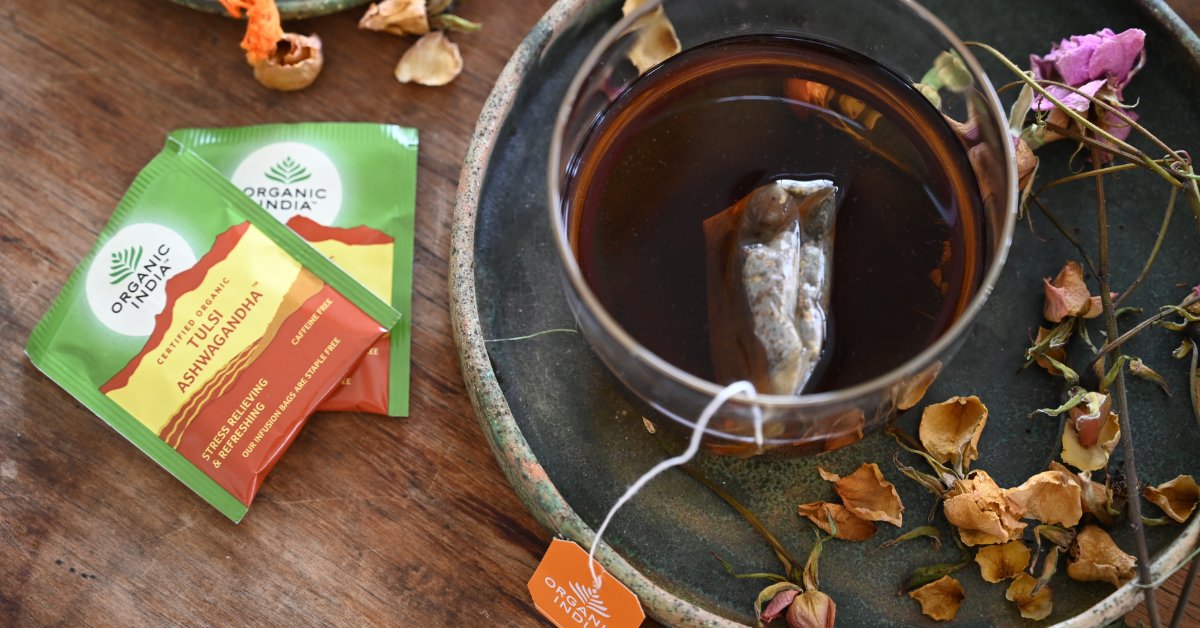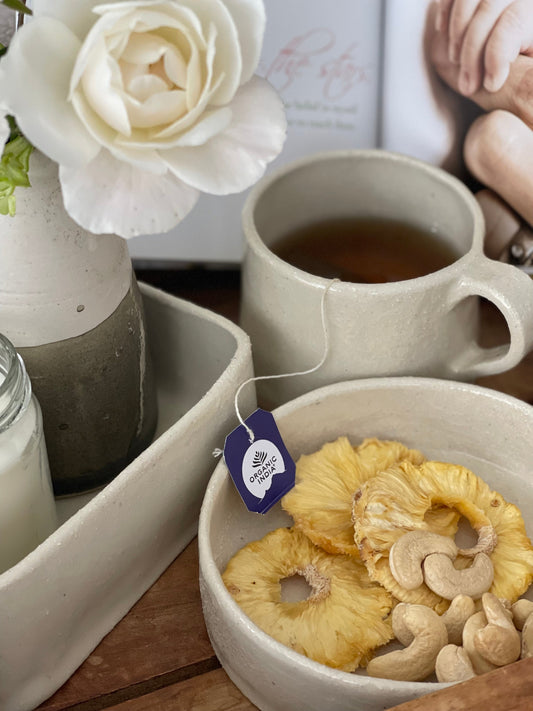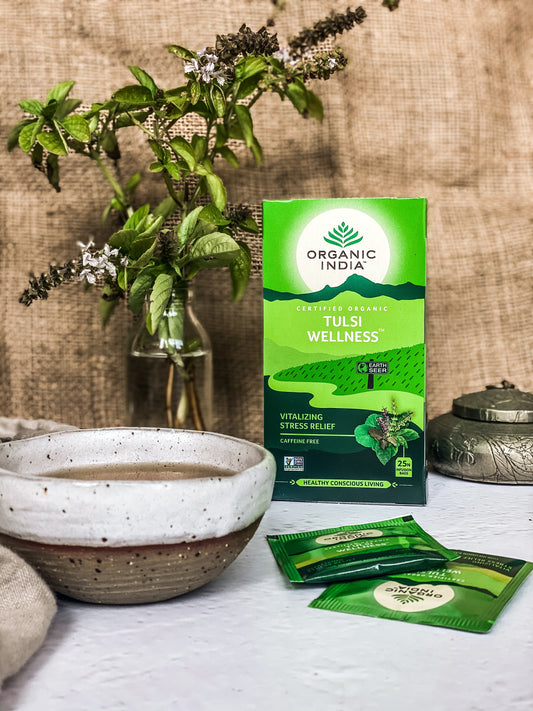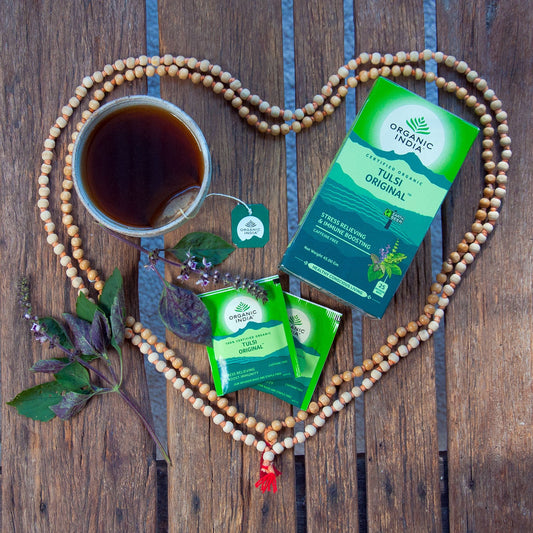“[Chamomile]… is a sattvic (pure) herb that is very balancing to the emotions… For most medical purposes its action is mild and serves as a harmonizing adjunct.” — Yoga of Herbs, by David Frawley and Vasant Lad
Chamomile always makes me think of Peter Rabbit. His story perfectly illustrates a key purpose of chamomile- when Peter finally arrived home after his misadventures in Mr McGregor’s garden, his mother put him to bed with chamomile tea. He had lost his shoes and his jacket, had been chased by Mr McGregor, found a hiding spot in a watering can containing water, and after a close shave with Mr McGregor’s cat, feeling frightened and exhausted, dashed out of the garden and home to the root of the fir-tree. Was it any wonder that by the evening, he was not very well.
With a dose of chamomile his mother delivered a gentle yet effective antidote to the stress, fatigue & illness Peter presented with. This classic herbal medicine soothed Peter’s body and his mind, most likely enabling him to drift off into a deep sleep and wake the following day full of energy and mischief!
Chamomile soothes our souls and heals our bodies with the gentleness of grandmotherly love. Efficacious, and yet subtle enough for sensitive systems, this daily soother comes from the daisy family- it’s a cute little flower with lots of healing power.
Aside from offering respite from worry and weariness, this time-tested herb from ancient Egypt, Greece and Rome covers lots of bases from a herbal medicine perspective. Here are a few common uses for this nourishing herb;
Digestive Aid
In Ayurveda, Chamomile is used to improve sluggish digestion, dry up excess mucus in the GI tract, stoke agni (digestive fire), and to expel gas. Many digestive disturbances can benefit from the anti-inflammatory and antispasmodic actions of this herb including irritable bowel and diverticulitis. Chamomile, especially if combined with ginger, will help to relieve nausea, heartburn, and abate loss of appetite.
Mental Relaxant & Sleep Support
Known as a soother for the anxious Kapha mind, relaxing and refreshing the nervous system and guiding the body and mind towards sleep. Chamomile as an antispasmodic will also assist with headache, relaxing blood vessels.
Pain Relief
Often added to massage oil in Ayurveda for back pain or used in compresses to offer pain relief including stomach cramps. As a smooth muscle relaxant for the uterus, Chamomile will ease menstrual cramp discomfort.
Tulsi Honey Chamomile
When paired with Ayurveda’s Queen of Herbs and soothing honey, the experience of true harmony is revealed. Wellness benefits are in every sip, with some highlights as follows;
Cold and Flu
Tulsi’s anti-viral, anti-bacterial and anti-fungal activity establish this herb’s role in infection protection. Tulsi has been shown to boost immune defences by enhancing immune response.
Drinking hot chamomile tea and inhaling its steam may also help respiratory complaints and the antibacterial properties in Chamomile may help with treatment of the common cold. Tulsi Honey Chamomile are a perfect trio during cold and flu season.
Burn and Wound Healing
Both Tulsi and Chamomile share a unique combination of antibacterial, antioxidant and anti-inflammatory activity making it useful for healing burns and wounds naturally.
Eye Health, Inflammation and Swelling
Tulsi Honey Chamomile teabags, cooled after steeping in boiling water can be placed over the eyes to reduce swelling and inflammation, and used topically elsewhere on the body. As a swab for gunky eyes, or to cleanse a wound this combination is hard to beat.
Mouth Wash
Tulsi and Chamomile share traditional use as herbal mouthwashes to treat bad breath, soothe inflammation, heal mouth sores, prevent gum disease and generally keep gums healthy. The broad spectrum protection Tulsi offers against infection includes the organism responsible for tooth decay Streptococcus mutans. Allow your tea to cool and then swish for a few minutes before drinking.
Acne, Eczema
As diaphoretics, and herbal anti-inflammatories, Tulsi and Chamomile can induce perspiration, a common strategy to heal skin disease and itches.
Natural Antihistamine
Great news for hay fever sufferers. Tulsi & Chamomile unite where there is allergic reaction, offering natural anti-histamine and anti-inflammatory properties, and reducing mast cell degranulation. Drink regularly during pollen season – Tulsi is a known rejuvenator for the respiratory system.
Oh Honey
Honey, the nectar of the gods, shares many synergies with our beloved Tulsi, being nutrient and antioxidant rich and anti-bacterial in nature. Honey as a wound healing agent and treatment for the common cold is abundant in anti-inflammatory goodness. Not only has honey had a valued place in traditional medicine for centuries, honey is just. plain. delicious!
P.S. And there’s Fennel!
Naturally cooling and sweet, Fennel’s special role in Ayurveda is as a digestive, used to strengthen and warm our agni (digestive fire) without provoking pitta. This is a tridoshic herb that also balances kapha and vata making fennel a helpful herb to keep on hand. Like its blend buddies Tulsi & Chamomile, fennel is anti-oxidant rich and offers anti-inflammatory properties. With digestion closely linked to the nervous system the addition of Fennel adds to the harmony of this blend.
So much goodness can be found in a cup of Tulsi Honey Chamomile. This blend is physically healing, soothing for the emotions and the soul, naturally sweet and smooth tasting. This is a nourishing blend for all ages that can be enjoyed all day, all year.
Caution: some folk are allergic to Chamomile (Matricaria chamomilla). It’s rare, but it does happen. If you’re allergic to any flowers or pollens in the daisy family (family Asteraceae, formerly Compositae) you may be allergic or sensitive to chamomile. Allergic reaction to chamomile tea is generally mild with symptoms including burning or itching of the mouth, throat and lips and a possible break out in hives. More serious reactions are quite rare.












